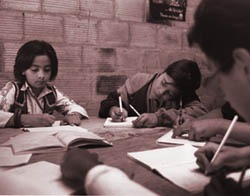
Videomaking for Social Change: Roberto Arevalo
Written by Alia-Anor Akaeze | Posted by: Anonymous
Chances are you’re thinking about a lot of things, but education probably isn’t one of them. And it should be, because in Colombia, education isn’t a tired stereotype, and it isn’t smoke-and-mirrors propaganda. Education is real, sin maquillage, and it is helping to dismantle the walls that separate the rich from the poor in places like the Bolivar City section of Santa Fe de Bogota. But don’t take my word for it. Just ask Roberto Arevalo. Better yet, go see his latest film. It speaks for itself, and you just might learn something.
"Sin Maquillaje" ("Without Makeup"), is the latest work of media educator Roberto Arevalo, a native of Colombia and resident of Somerville, MA, who is also the founder and director of the nationally acclaimed alternative media program The Mirror Project. "Sin Maquillaje" gives us a rare glimpse into a Colombia most of us have never considered: neighborhoods on the fringes of large urban centers populated by refugees of natural disasters, rural poverty, and seemingly endless political aggressions. In a section of Bogota where homes are little more than crumbling shacks and clean water is a luxury, Arevalo presents us with an inspiring portrait of dignity and empowerment through education. Training his camera on the students of the educational community Benposta Torres, Arevalo offers the student-residents of Bolivar City a forum for introducing themselves to their community, and to the larger constituency of Bogota society that is accustomed to not seeing them and to viewing them only as a problem. Then he goes one step further: he creates an opportunity for dialogue between these people of differing socioeconomic realities by screening his films for small groups in controlled settings, where he can also conduct workshops and interact one-on-one with his audience.
"I feel that there is nobody that is actually taking the time to do video to promote change in a sensible way," says Arevalo. "I think the uniqueness of my work is that I am one of the few [mediamakers] who comes from the struggling class and who is doing social documentary that breaks the typical formulas established by the mainstream media. Because the reality is that even the struggling class continues to use the formulas established by the media that oppresses people, and that doesn’t allow people to express themselves in the best way. So what I’m doing is creating my own way. This is my own beat."
In "Sin Maquillaje," Arevalo chose to shoot without the aid of a crew or extraneous lighting rigs, and with a single handheld camera and mic–without makeup. The safe space he creates inspires his subjects to articulate and express themselves honestly, and to open up their world to the camera as if being filmed is an everyday occurrence. Indeed, the down-to-earth quality of the last 10 minutes of the film in capturing the morning routine of one student’s family is in the very best tradition of documentary filmmaking, and we are pulled into their lives with an intimacy that would not have been possible in a larger production.
The middle child of five, Arevalo’s father was killed when he was seven years old, and his mother, with little education, was left to raise her children without the aid of social service agencies. "We were worried many times about eating. Sometimes we didn’t have enough money to buy shoes," he explains. "So of course I [can] relate to these people. I didn’t grow up in a neighborhood as poor as this one, but I grew up in a neighborhood that is very poor. My point of view comes pretty much from a similar struggle."
Creating safe havens through which to express and communicate one’s experience is the core component of all the various forms of Arevalo’s filmmaking. Through his Mirror Project, Arevalo teaches Somerville’s inner-city youth video as a form of self-expression, training teenagers how to use video and editing equipment and then encouraging them to go out and find their world. The resulting videos have been shown at venues like the Coolidge Corner Theatre in Brookline, MA, and the Museum of Fine Arts in Boston. The Project, begun in 1992, has produced more than 100 videos and is considered one of the most successful art programs for ‘at-risk’ youth in the country.
With "Sin Maquillaje," Arevalo has extended the concept of The Mirror Project to children in communities outside this country. This, then, is his ultimate message: "One of the major focuses of my work is to demystify the making of media, not just to make it for the elite. I think that any creative process should be part of every human being’s experience, because being creative is essential to human development and for happiness. And anybody can do it. Listen, if I can come here without knowing English, without having money to pay for school, and do something that is supposedly for the privileged, well, I think anybody should be able to do that. Why? Because that’s what’s going to allow people not just to express themselves, but to be more active in their own histories, in their own process, and to begin shaping not just their lives but other people’s lives in a positive way. So we want to make sure we duplicate the philosophy of The Mirror Project throughout the U.S. and elsewhere."
Arevalo is also the founder of Straight Up Pictures, a film production company and international media program that he developed to teach people how to document their lives and express themselves through writing, photography, and video.
For more information, visit http://www.mirrorproject.org










